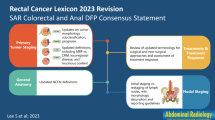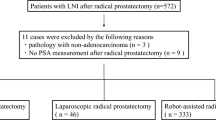Abstract
Purpose
Primary local excision (PLE) for early rectal cancers is associated with decreased surgical morbidity and mortality compared with major resection (MR). However, it is thought to be associated with poorer oncological outcomes. There is a paucity of data regarding PLE within the Australasian population. We present comparative post-operative and survival outcomes for stage 1 rectal cancers treated with PLE or MR from three Western Australian hospitals.
Methods
A retrospective analysis was performed on a prospectively maintained database of patients undergoing PLE or MR for stage 1 rectal cancers between February 1996 and May 2019.
Results
Of the 533 patients, 81 underwent PLE. Median post-operative admission was shorter for those undergoing PLE, with no significant difference in post-operative complication rate. Five-year overall survival was greater following MR (89.6% CI 86.1–92.3) compared with PLE (84.6% CI 73.8–91.2; p = 0.0003). There was no significant difference in 5-year cancer-specific survival (MR, 94.4% CI 91.5–96.3; PLE, 95.3% CI 86.0–98.5; p = 0.98) or 5-year disease-free survival (MR, 92.3% CI 89.1–94.7; PLE, 89.1% CI 78.5–94.7; p = 0.36). Local excision provided poorer local tumour control with an inferior 5-year local recurrence rate (MR, 2.16% CI 1.08–4.28; PLE, 10.9% CI 5.30–21.6; p = 0.0002). After controlling for confounders, PLE was significantly associated with worse local recurrence but did not significantly impact overall survival, cancer-specific survival, overall recurrence, or metastatic recurrence.
Conclusion
Local excision of early rectal cancer remains a viable alternative, in those unwilling or unable to undergo MR. Patients should be informed that while PLE is associated with poorer local pelvic control, this does not translate to worse survival.
Trial Registration



Similar content being viewed by others
References
Battersby NJ, Juul T, Christensen P, Janjua AZ, Branagan G, Emmertsen KJ, Norton C, Hughes R, Laurberg S, Moran BJ (2016) Predicting the risk of bowel-related quality-of-life impairment after restorative resection for rectal cancer: a multicenter cross-sectional study. Dis Colon Rectum 59(4):270–280
Garcia-Aguilar J, Mellgren A, Sirivongs P, Buie D, Madoff RD, Rothenberger DA (2000) Local excision of rectal cancer without adjuvant therapy: a word of caution. Ann Surg 231(3):345–351
Winde G, Nottberg H, Keller R, Schmid KW, Bünte H (1996) Surgical cure for early rectal carcinomas (T1). Dis Colon rectum 39(9):969–976
Sengupta S, Tjandra JJ (2001) Local excision of rectal cancer: what is the evidence? Dis Colon rectum 44(9):1345–1361
Brodsky JT, Richard GK, Cohen AM, Minsky BD (1992) Variables correlated with the risk of lymph node metastasis in early rectal cancer. Cancer 69(2):322–326
Morson BC (1966) Factors influencing the prognosis of early cancer of the rectum. Proc R Soc Med 59(7):607–608
Kidane B, Chadi SA, Kanters S, Colquhoun PH, Ott MC (2015) Local resection compared with radical resection in the treatment of T1N0M0 rectal adenocarcinoma: a systematic review and meta-analysis. Dis Colon rectum 58(1):122–140
Halverson AL, Morris AM, Cleary RK, Chang GJ (2019) For patients with early rectal cancer, does local excision have an impact on recurrence, survival, and quality of life relative to radical resection? Ann Surg Oncol 26:2497–2506
AJCC Cancer staging manual (2017). Cancer staging manual., 8th edn. Springer International Publishing,
You NY, Baxter NN, Stewart NA, Nelson NH (2007) Is the increasing rate of local excision for stage I rectal cancer in the United States justified?: a nationwide cohort study from the National Cancer Database. Ann Surg 245(5):726–733
Ptok H, Marusch F, Meyer F, Schubert D, Koeckerling F, Gastinger I, Lippert H (2007) Oncological outcome of local vs radical resection of low-risk pT1 rectal cancer. Arch Surg 142(7):649–654
De Graaf EJR, Doornebosch PG, Tollenaar RAEM, Meershoek-Klein Kranenbarg E, de Boer AC, Bekkering FC, van de Velde CJH (2009) Transanal endoscopic microsurgery versus total mesorectal excision of T1 rectal adenocarcinomas with curative intention. Eur J Surg Oncol 35(12):1280–1285
Lezoche E, Baldarelli M, Lezoche G, Paganini A, Gesuita R, Guerrieri M (2012) Randomized clinical trial of endoluminal locoregional resection versus laparoscopic total mesorectal excision for T2 rectal cancer after neoadjuvant therapy. Br J Surg 99(9):1211–1218
Elmessiry MM, Van Koughnett JAM, Maya A, Dasilva G, Wexner SD, Bejarano P, Berho M (2014) Local excision of T1 and T2 rectal cancer: proceed with caution. Color Dis 16(9):703–709
Stitzenberg KB, Sanoff HK, Penn DC, Meyers MO, Tepper JE (2013) Practice patterns and long-term survival for early-stage rectal cancer. J Clin Oncol 31(34):4276–4282
Allaix ME, Arezzo A, Giraudo G, Morino M (2012) Transanal endoscopic microsurgery vs. laparoscopic total mesorectal excision for T2N0 rectal cancer. J Gastrointest Surg 16(12):2280–2287
Endreseth BH, Myrvold HE, Romundstad P, Hestvik UE, Bjerkeset T, Wibe A, Group oboTNRC (2005) Transanal excision vs. major surgery for T1 rectal cancer. Dis Colon rectum 48 (7):1380–1388
Morino M, Risio M, Bach S, Beets-Tan R, Bujko K, Panis Y, Quirke P, Rembacken B, Rullier E, Saito Y, Young-Fadok T, Allaix ME (2015) Early rectal cancer: the European Association for Endoscopic Surgery (EAES) clinical consensus conference. Surg Endosc 29(4):755–773
Hahnloser D, Wolff BG, Larson DW, Ping J, Nivatvongs S (2005) Immediate radical resection after local excision of rectal cancer: an oncologic compromise? Dis Colon rectum 48(3):429–437
Bhangu A, Brown G, Nicholls R, Wong J, Darzi A, Tekkis P (2013) Survival outcome of local excision versus radical resection of colon or rectal carcinoma: a surveillance, epidemiology, and end results (SEER) population-based study. Ann Surg 258(4):563–571
Saraste D, Gunnarsson U, Janson M (2013) Local excision in early rectal cancer-outcome worse than expected: a population based study. Eur J Surg Oncol 39(6):634–639
Hazard LJ, Shrieve DC, Sklow B, Pappas L, Boucher KM (2009) Local excision vs. radical resection in T1-2 rectal carcinoma: results of a study from the surveillance, epidemiology, and end results (SEER) registry data. Gastrointest Cancer Res 3(3):105–114
Folkesson J, Johansson R, Påhlman L, Gunnarsson U (2007) Population-based study of local surgery for rectal cancer. Br J Surg 94(11):1421–1426
Peng J, Chen W, Sheng W, Xu Y, Cai G, Huang D, Cai S (2011) Oncological outcome of T1 rectal cancer undergoing standard resection and local excision. Colorect Dis 13(2):14–19
Bach S, Hill J, Monson J, Simson J, Lane L, Merrie A, Warren B, Mortensen NM (2009) A predictive model for local recurrence after transanal endoscopic microsurgery for rectal cancer. Br J Surg 96(3):280–290
Borstlap WAA, Coeymans TJ, Tanis PJ, Marijnen CAM, Cunningham C, Bemelman WA, Tuynman JB (2016) Meta-analysis of oncological outcomes after local excision of pT1–2 rectal cancer requiring adjuvant (chemo) radiotherapy or completion surgery. Br J Surg 103(9):1105–1116
Chakravarti A, Compton CC, Shellito PC, Wood WC, Landry J, Machuta SR, Kaufman D, Ancukiewicz M, Willett CG (1999) Long-term follow-up of patients with rectal cancer managed by local excision with and without adjuvant irradiation. Ann Surg 230(1):49–54
Lee L, Kelly J, Nassif GJ, Atallah SB, Albert MR, Shridhar R, Monson JR (2017) Chemoradiation and local excision for T2N0 rectal cancer offers equivalent overall survival compared to standard resection: a National Cancer Database analysis. J Gastrointest Surg 21(10):1666–1674
Acknowledgements
The authors would like to thank Richard Trevithick of the Western Australian Cancer Registry for his assistance in providing mortality data and death coding for the project.
Author information
Authors and Affiliations
Corresponding author
Ethics declarations
Conflict of interest
The authors declare that they have no conflict of interest.
Additional information
Publisher’s note
Springer Nature remains neutral with regard to jurisdictional claims in published maps and institutional affiliations.
Rights and permissions
About this article
Cite this article
Cohen, R., Platell, C. Primary local excision of stage 1 rectal cancer is not associated with worse oncological outcomes when compared with major resection. Int J Colorectal Dis 35, 607–614 (2020). https://doi.org/10.1007/s00384-020-03512-2
Accepted:
Published:
Issue Date:
DOI: https://doi.org/10.1007/s00384-020-03512-2




